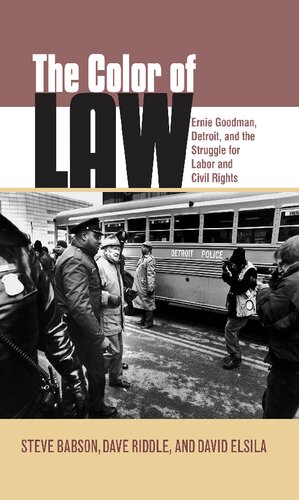

Most ebook files are in PDF format, so you can easily read them using various software such as Foxit Reader or directly on the Google Chrome browser.
Some ebook files are released by publishers in other formats such as .awz, .mobi, .epub, .fb2, etc. You may need to install specific software to read these formats on mobile/PC, such as Calibre.
Please read the tutorial at this link: https://ebookbell.com/faq
We offer FREE conversion to the popular formats you request; however, this may take some time. Therefore, right after payment, please email us, and we will try to provide the service as quickly as possible.
For some exceptional file formats or broken links (if any), please refrain from opening any disputes. Instead, email us first, and we will try to assist within a maximum of 6 hours.
EbookBell Team

4.4
92 reviewsIn a working life that spanned half a century, Ernie Goodman was one of the nation's preeminent defense attorneys for workers and the militant poor. His remarkable career put him at the center of the struggle for social justice in the twentieth century, from the sit-down strikes of the 1930s to the Red Scare of the 1950s to the freedom struggles, anti-war demonstrations, and ghetto rebellions of the 1960s and 1970s. The Color of Law: Ernie Goodman, Detroit, and the Struggle for Labor and Civil Rights traces Goodman's journey through these tumultuous events and highlights the many moments when changing perceptions of social justice clashed with legal precedent.
Authors Steve Babson, Dave Riddle, and David Elsila tell Goodman's life story, beginning with his formative years as the son of immigrant parents in Detroit's Jewish ghetto, to his early ambitions as a corporate lawyer, and his conversion to socialism and labor law during the Great Depression. From Detroit to Mississippi, Goodman saw police and other officials giving the "color of law" to actions that stifled freedom of speech and nullified the rights of workers and minorities. The authors highlight Goodman's landmark cases in defense of labor and civil rights and examine the complex relationships he developed along the way with individuals like Supreme Court Justice and former Michigan governor Frank Murphy, UAW president Walter Reuther, Detroit mayor Coleman Young, and congressman George Crockett. Drawing from a rich collection of letters, oral histories, court records, and press accounts, the authors re-create the compelling story of Goodman's life. The Color of Law demonstrates that the abuse of power is non-partisan and that individuals who oppose injustice can change the course of events.